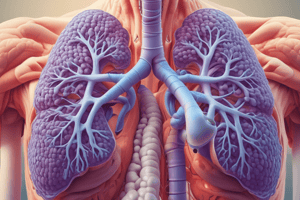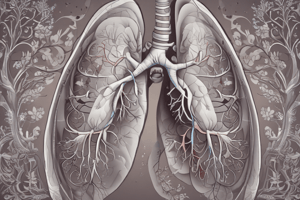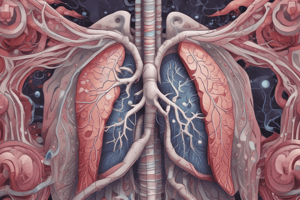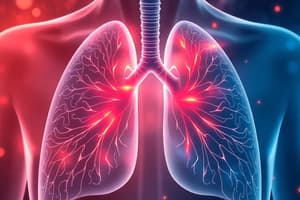Podcast
Questions and Answers
What is the term for the condition where a cough is triggered by stomach acid flowing back up into the esophagus?
What is the term for the condition where a cough is triggered by stomach acid flowing back up into the esophagus?
- Cough-variant asthma
- Upper airway cough syndrome
- Chronic bronchitis
- Gastroesophageal reflux disease (correct)
What would you recommend to a patient who has a cough and is diagnosed with GERD?
What would you recommend to a patient who has a cough and is diagnosed with GERD?
- Prescribe an antihistamine
- Prescribe an ACE inhibitor
- Recommend a bronchodilator
- Recommend GER treatment and follow-up (correct)
What is the term for the condition where a cough is the main symptom and is often associated with asthma?
What is the term for the condition where a cough is the main symptom and is often associated with asthma?
- Upper airway cough syndrome
- Chronic bronchitis
- Gastroesophageal reflux disease
- Cough-variant asthma (correct)
What is the term for the condition where the airways produce excess mucus, leading to a chronic cough?
What is the term for the condition where the airways produce excess mucus, leading to a chronic cough?
What is the term for the condition where the air sacs in the lungs are damaged, often leading to a chronic cough?
What is the term for the condition where the air sacs in the lungs are damaged, often leading to a chronic cough?
Which of the following is NOT a symptom of GERD?
Which of the following is NOT a symptom of GERD?
What is a common but under-recognized cause of a chronic cough in adults?
What is a common but under-recognized cause of a chronic cough in adults?
Which of the following is a diagnosis method for chronic cough?
Which of the following is a diagnosis method for chronic cough?
What is a type of inflammation in the airways that can cause a chronic cough?
What is a type of inflammation in the airways that can cause a chronic cough?
What is a complication of a viral upper respiratory tract infection that can cause a chronic cough?
What is a complication of a viral upper respiratory tract infection that can cause a chronic cough?
What is a characteristic of sputum in bacterial tracheobronchitis?
What is a characteristic of sputum in bacterial tracheobronchitis?
What is a symptom of bacterial sinusitis that can cause a chronic cough?
What is a symptom of bacterial sinusitis that can cause a chronic cough?
What is a type of cough that is often misdiagnosed as asthma?
What is a type of cough that is often misdiagnosed as asthma?
What is a risk factor for lung cancer that can cause a chronic cough?
What is a risk factor for lung cancer that can cause a chronic cough?
What is the primary distinguishing feature of a chronic cough?
What is the primary distinguishing feature of a chronic cough?
What is the significance of a dry cough in a patient with chronic cough?
What is the significance of a dry cough in a patient with chronic cough?
What is the most common cause of chronic cough in adults?
What is the most common cause of chronic cough in adults?
What is the primary diagnostic feature of eosinophilic bronchitis?
What is the primary diagnostic feature of eosinophilic bronchitis?
What is the relationship between chronic cough and COPD?
What is the relationship between chronic cough and COPD?
What is the significance of a cough that worsens at night?
What is the significance of a cough that worsens at night?
What is the primary diagnostic feature of chronic bronchitis?
What is the primary diagnostic feature of chronic bronchitis?
What is the relationship between asthma and chronic cough?
What is the relationship between asthma and chronic cough?
What is the primary purpose of Therapeutic Patient Education (TPE)?
What is the primary purpose of Therapeutic Patient Education (TPE)?
What is a barrier against treatment according to the World Health Organization (WHO)?
What is a barrier against treatment according to the World Health Organization (WHO)?
What is the goal of educating patients about their treatment?
What is the goal of educating patients about their treatment?
What is an example of a therapy-related intervention for 'poor adherers'?
What is an example of a therapy-related intervention for 'poor adherers'?
What is the benefit of self-management education for asthma patients?
What is the benefit of self-management education for asthma patients?
What is a key aspect of Therapeutic Patient Education (TPE)?
What is a key aspect of Therapeutic Patient Education (TPE)?
What is an example of a barrier to treatment adherence?
What is an example of a barrier to treatment adherence?
What is the focus of Therapeutic Patient Education (TPE)?
What is the focus of Therapeutic Patient Education (TPE)?
What should you do if you are within the 'orange zone' of the action plan?
What should you do if you are within the 'orange zone' of the action plan?
What should you do if you notice signs or symptoms of a relapse?
What should you do if you notice signs or symptoms of a relapse?
What is the importance of TPE in chronic disease management?
What is the importance of TPE in chronic disease management?
Why is it important to involve patients in the education and treatment plan?
Why is it important to involve patients in the education and treatment plan?
What should you do before beginning a physical activity in the 'green zone'?
What should you do before beginning a physical activity in the 'green zone'?
What should you adjust if necessary, to avoid relapse?
What should you adjust if necessary, to avoid relapse?
What is the primary benefit of an individualized education programme on asthma control?
What is the primary benefit of an individualized education programme on asthma control?
What is the focus of a self-management education programme for asthma patients?
What is the focus of a self-management education programme for asthma patients?
What is the significance of PEF monitoring in asthma self-management?
What is the significance of PEF monitoring in asthma self-management?
What is the outcome of a disease management programme on asthma patients?
What is the outcome of a disease management programme on asthma patients?
What is the goal of a structured step-wise and patient-centered approach to asthma management?
What is the goal of a structured step-wise and patient-centered approach to asthma management?
What is the outcome of a self-asthma action plan on asthma control?
What is the outcome of a self-asthma action plan on asthma control?
What is the focus of a self-management model of illness behaviour in asthma patients?
What is the focus of a self-management model of illness behaviour in asthma patients?
What is the benefit of using a patient-centered approach to asthma management?
What is the benefit of using a patient-centered approach to asthma management?
What is the primary goal of a self-asthma action plan?
What is the primary goal of a self-asthma action plan?
What is the outcome of a disease management program on asthma patients?
What is the outcome of a disease management program on asthma patients?
What is the focus of a self-management model of illness behavior in asthma patients?
What is the focus of a self-management model of illness behavior in asthma patients?
What is the significance of PEF monitoring in asthma self-management?
What is the significance of PEF monitoring in asthma self-management?
What is the benefit of an individualized education program on asthma control?
What is the benefit of an individualized education program on asthma control?
What is the primary benefit of a structured step-wise and patient-centered approach to asthma management?
What is the primary benefit of a structured step-wise and patient-centered approach to asthma management?
What is the outcome of a self-asthma action plan on asthma control?
What is the outcome of a self-asthma action plan on asthma control?
What is the focus of self-management education for asthma patients?
What is the focus of self-management education for asthma patients?
What is the primary goal of Therapeutic Patient Education (TPE)?
What is the primary goal of Therapeutic Patient Education (TPE)?
What is the significance of involving patients in the education and treatment plan?
What is the significance of involving patients in the education and treatment plan?
What type of epithelium is found in the anterior/lingual part of the epiglottis?
What type of epithelium is found in the anterior/lingual part of the epiglottis?
Which of the following muscles controls the movement of the cartilages in the larynx?
Which of the following muscles controls the movement of the cartilages in the larynx?
What type of cell is responsible for producing mucinogen in the respiratory epithelium?
What type of cell is responsible for producing mucinogen in the respiratory epithelium?
What is the characteristic of the submucosa in the trachea?
What is the characteristic of the submucosa in the trachea?
What is the function of the elastic fibers in the trachea?
What is the function of the elastic fibers in the trachea?
What is the origin of the trachea?
What is the origin of the trachea?
What type of cartilage is found in the epiglottis?
What type of cartilage is found in the epiglottis?
What is the function of the basal cells in the respiratory epithelium?
What is the function of the basal cells in the respiratory epithelium?
What is the characteristic of the adventitia in the trachea?
What is the characteristic of the adventitia in the trachea?
What is the structure that separates the mucosa from the submucosa in the trachea?
What is the structure that separates the mucosa from the submucosa in the trachea?
Flashcards are hidden until you start studying
Study Notes
Chronic Cough
- A chronic cough is defined as a cough that lasts 8 weeks or longer in adults, or 4 weeks in children.
- It can interrupt sleep, cause exhaustion, and lead to vomiting, lightheadedness, and even rib fractures in severe cases.
Causes of Chronic Cough
- Upper airway cough syndrome (UACS)
- Cough-variant asthma
- Gastroesophageal reflux disease (GERD)
- Smoking
- Blood pressure drugs (e.g., ACE inhibitors)
- Chronic bronchitis
- Chronic obstructive pulmonary disease (COPD)
- Emphysema
Associated Symptoms
- Runny or stuffy nose
- Postnasal drip
- Frequent throat clearing and sore throat
- Hoarseness
- Wheezing and shortness of breath
- Heartburn or sour taste in mouth
- Coughing up blood (rarely)
Less Common Causes
- Aspiration (food in adults, foreign bodies in children)
- Bronchiectasis (damaged airways)
- Bronchiolitis (infections)
- Cystic fibrosis
- Laryngopharyngeal reflux
- Lung cancer
- Nonasthmatic eosinophilic bronchitis
- Sarcoidosis
Evaluation of Chronic Cough
- Medical history and physical examination
- Pulmonary function tests (PFTs)
- X-rays or chest radiography
Diagnosis and Treatment
- GERD treatment (acid blockers) and follow-up
- PFTs to rule out asthma or other respiratory conditions
- Consideration of other causes, such as bronchiectasis, lung cancer, or eosinophilic bronchitis, based on symptoms and test results
Therapeutic Patient Education (TPE)
- TPE approach combines subjective and objective aspects of patient care
- Considers patient's adaptation process, subjective and objective needs
- Reduces long-term care costs for patients and society
Purpose of TPE
- Produces therapeutic effects and improves quality of life
- Helps patients prevent, manage, or avoid complications and maintain or improve their treatment
Evolution of Patient's Attitude
- Acknowledges and copes with their condition
- Manages and adapts to their treatment
Effectiveness of TPE for Asthma
- Improves medication adherence, reduces emergency visits and hospitalizations
- Reviews and studies support its effectiveness in self-management education
Barriers to Treatment Adherence
- Social/economic, therapy-related, patient-related, and condition-related barriers
- Identified by the World Health Organization
Individualized Education Program
- Used for "poor adherers" with three individual sessions
- Includes knowledge and skill assessment, demonstration, and objectives
Objectives of the Program
- Take action according to environment
- Avoid precipitating factors and adjust treatment
- Recognize allergies and precipitating factors to avoid relapse
Result of TPE
- Improved asthma control, inhaler skills, and health-related quality of life
- Sustained effects eight weeks after intervention
Therapeutic Patient Education (TPE)
- TPE approach combines subjective and objective aspects of patient care
- Considers patient's adaptation process, subjective and objective needs
- Reduces long-term care costs for patients and society
Purpose of TPE
- Produces therapeutic effects and improves quality of life
- Helps patients prevent, manage, or avoid complications and maintain or improve their treatment
Evolution of Patient's Attitude
- Acknowledges and copes with their condition
- Manages and adapts to their treatment
Effectiveness of TPE for Asthma
- Improves medication adherence, reduces emergency visits and hospitalizations
- Reviews and studies support its effectiveness in self-management education
Barriers to Treatment Adherence
- Social/economic, therapy-related, patient-related, and condition-related barriers
- Identified by the World Health Organization
Individualized Education Program
- Used for "poor adherers" with three individual sessions
- Includes knowledge and skill assessment, demonstration, and objectives
Objectives of the Program
- Take action according to environment
- Avoid precipitating factors and adjust treatment
- Recognize allergies and precipitating factors to avoid relapse
Result of TPE
- Improved asthma control, inhaler skills, and health-related quality of life
- Sustained effects eight weeks after intervention
Bronchioles
- Bronchioles are the 10th to 15th generation of dichotomous branching of the bronchial tree
- Less than 1 mm in diameter
- Supplies air to a pulmonary lobule
- Bronchioles possess no cartilage
- The epithelial lining of bronchioles ranges from ciliated simple columnar with occasional goblet cells in larger bronchioles to simple cuboidal (many with cilia) with occasional Clara cells and no goblet cells in smaller bronchioles
- The lamina propria of bronchioles has no glands; it is surrounded by a loose meshwork of helically oriented smooth muscle layers
Clara Cells
- Clara cells are believed to protect the bronchiolar epithelium by lining it with their secretory product
- Produce a surfactant-like material that reduces the surface tension of bronchioles and facilitates the maintenance of their patency
- Clara cells divide to regenerate the bronchiolar epithelium
Trachea
- The trachea is rounded anteriorly but flattened posteriorly
- 10 to 12 horse-shoe-shaped hyaline cartilage rings (C-rings) that are connected to each other by smooth muscle
- The perichondrium of each C-ring is connected to those of other rings
- Provides flexibility and permits elongation during inspiration
Respiratory Epithelium
- The respiratory epithelium undergoes reversible alterations (metaplasia) due to chronic exposure to irritants (e.g., cigarette smoke and coal dust)
- Increase in the number of goblet cells relative to ciliated cells, producing a thicker layer of mucus to remove irritants
- Reduced number of cilia retards the rate of mucus elimination, resulting in congestion
Bronchi
- Begins at the bifurcation of the trachea
- Composed of airways located outside and inside the lung
- Outside: 1° bronchi, extrapulmonary bronchi
- Inside: intrapulmonary bronchi, bronchioles, respiratory bronchioles
Cartilages
- Elastic cartilages (unpaired epiglottis, paired corniculate and cuneiform cartilages, and superior aspect of the arytenoids) connected to one another by ligaments
- Their movements are controlled by intrinsic and extrinsic skeletal muscles
Epiglottis
- Flexible flap of tissue, consisting of central elastic cartilage, covered by mucosa on both sides
- During swallowing, positioned horizontally, closing off the upper entrance to the larynx
- During respiration, stands straight up in the vertical position, permitting the flow of air
Studying That Suits You
Use AI to generate personalized quizzes and flashcards to suit your learning preferences.






